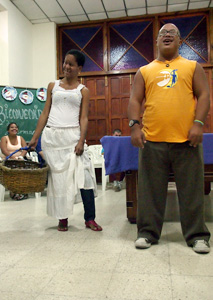
Credits: Worms/Caritas
In Cienfuegos, Cuba, a group of young people with Down Syndrome are putting on a show for their parents and friends. The young people delight in singing and dancing.
Mario is very moved by his daughter’s performance. “Since my daughter joined the Caritas group, she is much happier. In the morning, she sings around the house. On the street, she is no longer scared to talk to our neighbours. Everybody tells me how much she has changed.”
Caritas Cuba supports people from groups that are socially disadvantaged and vulnerable, especially people with special educational needs and their families.
“You can’t imagine what the support of Caritas represents,” says the mother of Jose, a young man in his twenties who also has Down Syndrome. “We joined the programme two years ago. The change in Jose is extraordinary.”
In a parish hall at the heart of Havana, Jose is perfecting how to shave alongside a teacher. It’s the second time he shaves alone.
His mother said, “The Caritas programme is unique. It is the only one that believes in the development of people with Down Syndrome. Our children are supervised by professionals. They gain greater autonomy. Our children receive a lot of affection and feel fully accepted.”
In Havana, various workshops are offered to the young people in the group. Cookery, sewing, ironing, hairdressing, educational games, DIY, drawing, make-up, all these activities pursue one aim: independence.
“This is the first priority for parents,” says Maritza Sánchez Abillud, director of Caritas Cuba. “For parents who have a child with developmental difficulties, their ability to live independently is the central issue. ‘What will happen to my child when I am no longer here?’ This is the most frequent question that comes up in discussions with parents.”
Corazón is Caritas support group in Alamar in the Havana region. Young people take a course in reading and writing. While the instructors look after them, the parents also receive support.
“We are going to work together on our breathing, while practising massage on our arms, legs and head,” said the Caritas psychologist, ending a workshop with parents on the importance of good stress management. “Parents of people with Down Syndrome or autism look after their child without a break. It is very physically and mentally demanding. They need to learn to manage a multitude of complex situations. It is important for them to take some time to care for themselves.”
These meetings enable parents to create links of friendship and solidarity. The newcomers realise that they are not alone.
“My wife and I had no information on Down Syndrome,” says Roberto. “Our daughter was living in her own world. She almost never left the house. We didn’t know she could develop, learn and communicate. Now thanks to God, Caritas and other parents supporting us, this has all changed.”
Nita, a mother, said, “With the Corazón group, we are no longer alone. We are getting to know each other’s children and we can spend time together. I also know that I can leave my son with one of the other families if need be. If I have a problem, I can count on the other parents to help me.”
Roberto said, “We were scared about the stares of people and we were overly protective.” Now he and his wife no longer hesitate to go out with their daughter.
“It isn’t our daughter who has a problem with others,” he said. “It is society that doesn’t understand that people affected by Down Syndrome are like us in spite of the limitations of their disability. Understanding our children better means changing society’s perspective on disabled people.”
